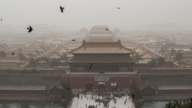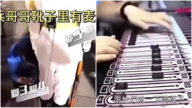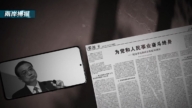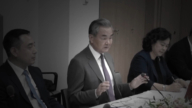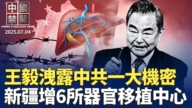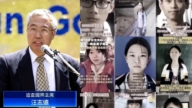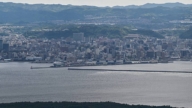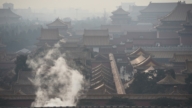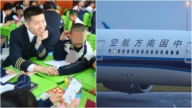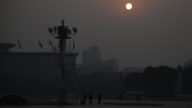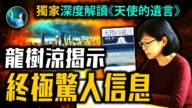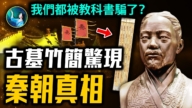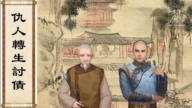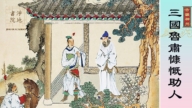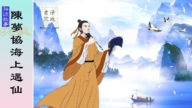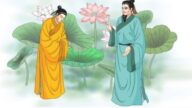【新唐人2012年6月21日讯】长期深居简出的前中共人大委员长乔石,最近推出新书《论民主与法制》,20号在北京人民大会堂举办发布会,随后在全国范围内发行。新书内容大部分属于第一次公开发表。在中共十八大来临之前,对于乔石重出江湖,高调论民主与法制,海内外人士各有不同的说法。下面一起去听一听他们的分析。
6月20号,乔石推出的新书——《论民主与法制》,在北京人民大会堂举办发布会。官方媒体也为乔石的新书进行了报导。
这本书收录了乔石从1985年至1998年担任中共领导人期间,有关民主与法制的重要讲话,全书分上、下两集,共102篇,约44万字,书中绝大部分是第一次公开发表。
针对乔石的《论民主与法制》,浙江前《海洋报》记者昝爱宗表示,在中共体制内,中国根本没有新闻自由,司法也不独立,更没有人民选举,所以谈不上民主和法制。昝爱宗认为,乔石可能是想把他自己以前在职时的一些东西推出来,留作纪念,也是给他后代留下一点遗产。
昝爱宗:“中国是一党专政的国家,它不存在民主。因为民主要有选票的,要有司法,立法要独立的,行政要独立的,要有选票来选举领导人,如果没有选票就没有民主,所以它是空的。对于法制,它也不是真正的法制,它是统治者的工具。”
大陆民主人士恩广表示,作为中共体制内退下来的人,他们在中共体制内的这种民主与法制论调,相对能赢得民众的一点掌声,但实际对中国走向民主起不到多大作用。
恩广:“就是在同一体制内的情况下,他们只是相对的一种点化,也就是相对的论调一下,真正的能不能做到,以及他们又想做到什么程度,他们自己也不一定完全有底。”
不过,恩广分析,这种民主与法制的论调,不排除是乔石个人的意愿,希望能对中国未来的政治格局产生一点影响。
乔石在十三、十四两届政治局常委中,是仅次于赵紫阳、李鹏和江泽民的第3号人物,由于他曾经担任中央办公厅主任、中组部长、中央政法委书记等多项要职,一直被视为中共的实权人物。而在1997年中共的十五大上,乔石退出政治局常委,翌年卸任全部党、政职务。乔石为什么会从政治局常委的位子上退下来,外界众说纷纭。有传言说,乔石是遭江泽民设计而退出政治局,因此民间有“江落石出”的传闻。
据了解,退休后的乔石长住浙江杭州,极少公开露面,即使中共建国60周年、建党90周年、北京奥运等大型活动,都不见乔石的身影。
然而,薄熙来事件爆发后,有消息说,在支持胡锦涛拿下血债派继承人薄熙来等一些重大问题上,都有乔石在暗中发力。
而当江泽民开始镇压法轮功之前,乔石曾经代表老干部向中共中央递交了调查报告,报告论述“法轮功于国于民有百利而无一害”。然而,乔石却遭到江泽民的诬指,指称他是法轮功“4.25和平请愿”的“幕后高手。”
时事评论员蓝述:“ 乔石在退休了这么长时间以后,突然之间又高调的复出,那么毫无疑问,有一条是他说明了,江泽民从1999年开始,一手主导的对法轮功的镇压,难以维计,继续不下去了。同时,也说明这个中共内部,有一派人认识到对镇压法轮功,它所引起的中国社会的一个非常的不和谐。”
蓝述表示,江派势力,已经日落西山,在过去十几年里,由于镇压法轮功,牵扯了巨大的人力、物力,损害了上亿民众的信仰和家庭。蓝述指出,中共给中国带来的这场民族性灾难,已经到了该结束的时候了。
采访编辑/唐睿 后制/朱娣
Qiao Shi’s New Book Advocating Democracy
Qiao Shi, ex-chairman of the National People’s Congress
Standing Committee of the Chinese Communist Party (CCP),
rarely showed his face in public since his retirement in 1998.
On Wednesday, his new book “On Democracy and Rule
of Law" was released in a high profile fashion in Beijing.
The book will be published nationwide,
with most contents being unveiled for the first time.
Qiao’s rise to further prominence ahead of the CCP’s 18th
Congress, with his openly advocating democracy and rule of law,
has aroused different public opinions and speculation
in China and overseas.
On June 20 at the Great Hall of the People in Beijing,
Qiao Shi launched his new book,
“On Democracy and Rule of Law."
The CCP official media also reported on this new book.
The book contains Qiao’s important speeches on democracy
and the rule of law that were made over the course of 1985-1998, when Qiao held senior positions in the CCP.
Consisting of two parts, the volume has 102 articles in total,
about 440,000 words.
Most of its contents are being published for the first time.
Zan Aizong, former journalist of Zhejiang-based Ocean News,
comments on Qiao Shi’s new book.
“China has no freedom of press under the rule of the CCP,
nor an independent judiciary and general election, let alone democracy and the rule of law," says Zan.
The book might be intended to be a souvenir of Qiao Shi’s
work performance, and a small legacy for his offspring, Zan figures.
Zan Aizong: “China is a one-party state without democracy.
Democracy means voting, having an independent judiciary,
legislative and administrative power.
Without voting there would be no democracy. The CCP’s
legal system isn’t in its real sense, but a tool serving the rulers."
Chinese pro-democracy activist, En Guang, says that
retired CCP officials’advocacy for democracy and
rule of law might win applause from the public.
But in reality, it cannot play a significant role in China’s
democratic development, En Guang thinks.
En Guang: “They still stay within the CCP system, just
speak out or advocate (for ideals).
Can they really carry out their claims, and to what extent?
They themselves might not have greater assurance."
En Guang analyzes that Qiao Shi’s talk on democracy
and rule of law does not exclude his personal wishes.
That is, Qiao hopes his views may have some implications
for China’s future politics.
In the 13th and 14th generation of the CCP’s politburo’s
standing committee,
Qiao Shi was ranked No. 3 in leadership,
only second to Zhao Ziyang, Li Peng and Jiang Zemin.
Qiao once served as General Office director of the CCP’s
Central Committee, head of the Organization Department of the Central Committee,
secretary of the Central Political and Legal Affairs Committee, among others.
Qiao has long been deemed as a figure with real power
in the CCP.
In 1997 at the 15th Party Congress, Qiao Shi stepped down
from his seat in the politburo standing committee, and retired from politics the next year.
Opinion varied on the reason behind Qiao’s leaving
the politburo standing committee.
Rumors said that Qiao Shi fell into the clutches
of Jiang Zemin.
“As Jiang sinks Qiao Shi surfaces" was once a saying,
considered hearsay, that circulated in China’s civil society.
After retirement, Qiao Shi has lived in Hangzhou, Zhejiang,
with very few public appearances.
Qiao did not show up even on the CCP’s 60th anniversary
of P.R.China’s founding, the 90th anniversary of its Party founding, and at the 2008 Olympic Games.
However, sources say that after Bo Xilai’s case was exposed,
Qiao Shi played key roles behind Hu Jintao’s removing Bo
and in other major political issues.
Before Jiang Zemin started the persecution of Falun Gong,
Qiao Shi, representing the CCP’s senior veteran cadres,
submitted a survey report to the CCP Central Committee.
The report concluded, “Falun Gong has no harm
but only benefits for the country and the people."
Yet Jiang Zemin suspected Qiao Shi could be
the mastermind behind the scenes of
the “4.25 peaceful petition" staged
by Falun Gong practitioners in 1999.
Lan Shu (Critic): “Qiao Shi retired so long ago, now he
suddenly rose to prominence again, which, no doubt,
indicates that the persecution dominated by Jiang Zemin
against Falun Gong since 1999 is hard to sustain now.
it also shows that an internal CCP faction has realized that
the persecution against Falun Gong has created great social disorder in China."
Lan Shu notes that Jiang’s clique has been on the wane.
In the past 10+ years, the CCP’s persecution of Falun Gong
has exhausted huge manpower and material resources,
causing harms to hundreds of millions of people, their faiths
and families.
Now it is time to end the disaster that the CCP has brought
to the whole Chinese nation, Lan Shu remarks.



